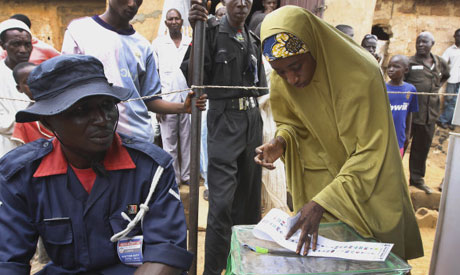
A Muslim woman prepares to vote during a gubernatorial election in Kaduna, Nigeria, Thursday, (AP).
Two Nigerian states hit hard by deadly riots after presidential elections went back to the polls for governor races Thursday amid a security lockdown and with scores still displaced.
Soldiers accompanied electoral officials to polls in Kaduna and Bauchi states and the electoral commission scrambled to find some 2,000 workers to replace those who refused to show up because of fears of violence.
Police and military personnel in armoured vehicles patrolled the streets of Kaduna city, the capital of the same state, and set up roadblocks to search cars. Police kept a close eye on Bauchi city, the capital of that state.
"If any of you is caught attempting to snatch or steal ballot papers or boxes, we will kill you," Bauchi state police commissioner Amana John Abakasanga told a group of youths at a polling station in Bauchi after they could not produce voters' cards.
Vice President Namadi Sambo, who is from Kaduna and had his house torched in last week's rioting, went to his polling place which was ringed by dozens of security agents, including bomb squad officers and police with dogs.
Police armed with rifles cordoned off the roads leading to the area.
An outbreak of unrest, which a local rights group says killed more than 500 people after April 16 presidential polls, forced authorities to delay governorship and state assembly elections in Kaduna and Bauchi by two days.
Kaduna and neighbouring Bauchi became the epicentre of the unrest, ignited by the victory of incumbent Goodluck Jonathan in the presidential elections.
The violence spiralled and spilled across a dozen other states, displacing an estimated 74,000 people. Many have taken up residence in increasingly squalid displaced camps.
Turnout appeared low in many places on Thursday.
"People are still scared because of last week's mayhem," said Solomon Patrick, a 41-year-old civil servant at a polling place in the Bauchi state capital, also called Bauchi.
Some people have been relocated to completely different areas of the state, making voting impossible.
"We feel that we are not Nigerians," said Musa Yusuf, registered in the devastated town of Zonkwa, 180 kilometres (110 miles) from his displaced camp in Kaduna.
Most other states held governorship elections on Tuesday. Turnout was low in a number of areas, with some afraid to venture out to cast ballots in the aftermath of the violence.
Jonathan, a Christian from the south, defeated his main rival, ex-military ruler Muhammadu Buhari, a northern Muslim, in the April 16 vote.
Though observers described the conduct of the election as a major step forward for Nigeria, Jonathan's victory ignited rioting across the north amid accusations of rigging.
The presidential election exposed sharp regional divisions between the country's mainly Christian south and the predominantly Muslim north.
The violence led to clashes between Christians and Muslims while churches and mosques were torched. Though calm has been restored by a heavy military deployment, people were still streaming into displaced camps, relief officials said.
Local radio and television stations repeatedly broadcast appeals for calm and tolerance ahead of Thursday's elections.
Kaduna occupies a historically significant place in the politics in Nigeria, Africa's most populous country. It was until 1967 the headquarters of Nigeria's northern region.
Kaduna was also a centre of inter-communal clashes in 2000 and 2003 that claimed hundreds of lives.
Both Kaduna and Bauchi states are currently controlled by the ruling Peoples Democratic Party, but it faces challenges from the opposition.
Short link: